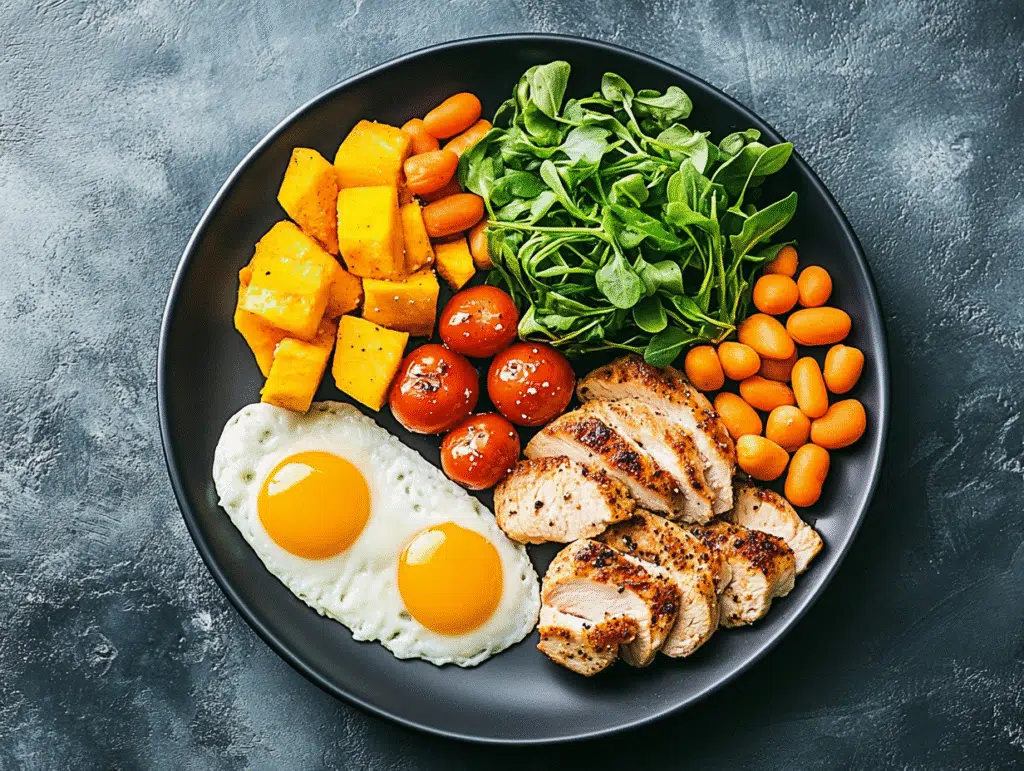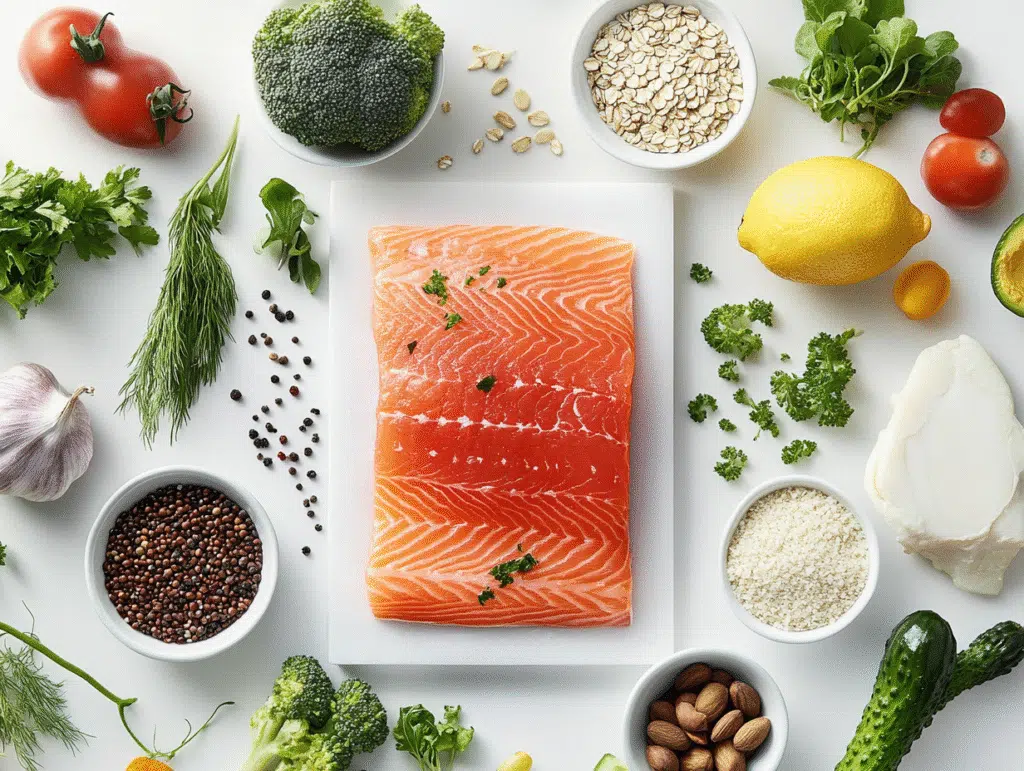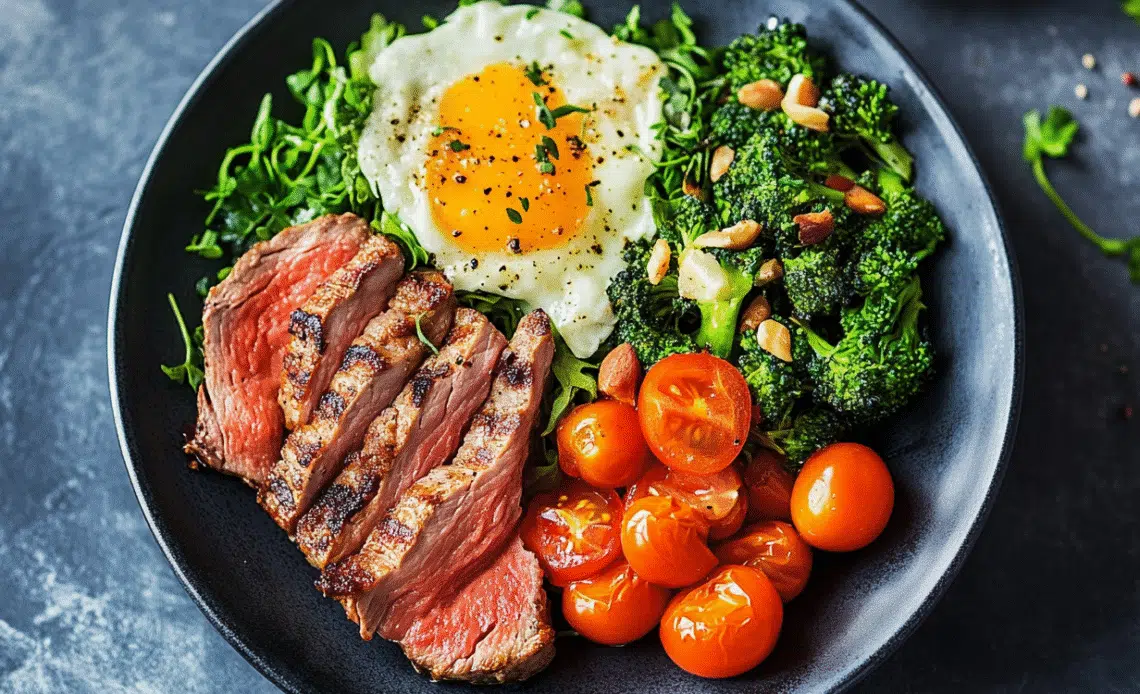Building muscle while managing diabetes presents unique challenges that require careful balancing of protein intake, blood sugar control, and nutrient timing. Many people with diabetes believe they must choose between effective muscle building and stable glucose levels, but this couldn’t be further from the truth. This 7-Day High-Protein Diabetes-Friendly Meal Plan to Help Build Muscle, Created by a Dietitian demonstrates how strategic nutrition can support both goals simultaneously, providing your body with the building blocks it needs for lean muscle development while maintaining optimal blood sugar control.
Why This Meal Plan Is Great for You
This comprehensive 7-Day High-Protein Diabetes-Friendly Meal Plan to Help Build Muscle addresses the specific nutritional needs of people with diabetes who want to increase muscle mass and improve body composition. Unlike generic high-protein diets that ignore blood sugar management, this plan provides 25-35 grams of high-quality protein per meal while carefully controlling carbohydrate timing and glycemic impact.
Each meal is designed to support muscle protein synthesis through complete amino acid profiles while preventing glucose spikes that can interfere with recovery and muscle growth. The plan emphasizes lean proteins, complex carbohydrates with low glycemic impact, and nutrient timing strategies that optimize both muscle building and metabolic health. This approach not only supports muscle development but also improves insulin sensitivity, making diabetes management easier over time.

What Is High-Protein Nutrition for Diabetes and Why It Matters
High-protein nutrition for diabetes involves consuming adequate protein to support muscle protein synthesis while managing carbohydrate intake to prevent blood sugar fluctuations. Research shows that people with diabetes often have increased protein needs due to altered metabolism and potential protein losses, yet many don’t consume enough to support muscle maintenance and growth.
This 7-Day High-Protein Diabetes-Friendly Meal Plan to Help Build Muscle provides approximately 1.2-1.6 grams of protein per kilogram of body weight daily, which falls within the optimal range for muscle building while supporting glucose control. The plan strategically combines protein with fiber-rich vegetables and controlled portions of complex carbohydrates to create meals that satisfy hunger, stabilize blood sugar, and fuel muscle recovery.
The timing of protein intake is equally important, with each meal providing 25-35 grams of protein to maximize muscle protein synthesis throughout the day. This approach helps prevent the muscle loss that often accompanies diabetes while supporting the development of new lean tissue.
Health Benefits
The health benefits of this high-protein approach extend far beyond muscle building. Increased muscle mass improves insulin sensitivity by providing more glucose storage capacity and increasing metabolic rate. Each pound of muscle tissue burns approximately 6-7 calories per day at rest, contributing to better weight management and glucose control.
Protein has a higher thermic effect than carbohydrates or fats, meaning your body burns more calories digesting and processing protein-rich foods. This metabolic boost, combined with protein’s superior satiety effects, helps control appetite and reduce cravings for high-glycemic foods that can destabilize blood sugar.
The amino acids provided in this meal plan support not just muscle building but also immune function, wound healing, and neurotransmitter production. People with diabetes often have compromised wound healing and immune function, making adequate protein intake even more critical for overall health and recovery.
Regular resistance training combined with this high-protein nutrition plan can significantly improve glycemic control, reduce medication requirements, and lower the risk of diabetes-related complications including cardiovascular disease and neuropathy.
Challenges or Limitations
Implementing this 7-Day High-Protein Diabetes-Friendly Meal Plan to Help Build Muscle may present initial challenges as you adjust meal timing and portion sizes. Some people experience digestive discomfort when significantly increasing protein intake, so gradual implementation over 7-10 days may be necessary.
Cost can be a consideration since high-quality protein sources like lean meats, fish, and dairy products typically cost more than carbohydrate-based foods. However, the satiety provided by protein often reduces overall food consumption and snacking, potentially offsetting some cost increases.
Meal preparation requires more planning than convenience-based eating, but batch cooking proteins and pre-portioning meals can streamline the process. Social eating situations may require advance planning to ensure adequate protein intake while maintaining blood sugar control.
People taking diabetes medications, particularly insulin, may need dosage adjustments as improved muscle mass and insulin sensitivity can alter glucose metabolism. Close monitoring and healthcare provider communication are essential during the transition period.
provides optimal protein distribution throughout the day to maximize muscle protein synthesis while maintaining blood glucose stability. Monitor blood sugar levels closely, especially post-workout, and adjust medication timing as needed with healthcare provider guidance. Hydration is crucial with increased protein intake – aim for 3-4 liters of water daily.

Day 1
Breakfast: Protein-packed scrambled eggs (3 whole eggs + 2 egg whites) with spinach and 1 slice Ezekiel toast Lunch: Grilled chicken breast (6 oz) with quinoa (1/2 cup) and steamed broccoli Dinner: Baked salmon (6 oz) with roasted sweet potato (1 medium) and asparagus Snacks: Greek yogurt (1 cup) with almonds, post-workout whey protein shake with berries
Day 2
Breakfast: High-protein overnight oats with Greek yogurt, protein powder, and cinnamon Lunch: Lean ground turkey (5 oz) stir-fry with mixed vegetables over brown rice (1/2 cup) Dinner: Grilled beef sirloin (6 oz) with cauliflower mash and green beans Snacks: Cottage cheese (1 cup) with cucumber slices, hard-boiled eggs (2 whole)
Day 3
Breakfast: Protein smoothie with whey powder, spinach, berries, and unsweetened almond milk Lunch: Pan-seared white fish (6 oz) with roasted Brussels sprouts and quinoa (1/2 cup) Dinner: Herb-crusted chicken breast (6 oz) with baked sweet potato and steamed broccoli Snacks: Greek yogurt parfait with protein powder, casein protein pudding before bed
Day 4
Breakfast: Vegetable omelet (3 eggs) with bell peppers, mushrooms, and avocado slice Lunch: Grilled salmon (6 oz) with wild rice (1/2 cup) and roasted zucchini Dinner: Lean ground turkey meatballs (5 oz) with cauliflower rice and green vegetables Snacks: Protein shake with almond butter, cottage cheese with cherry tomatoes
Day 5
Breakfast: High-protein pancakes made with protein powder, eggs, and oats, topped with Greek yogurt Lunch: Baked chicken thigh (6 oz, skin removed) with quinoa salad and mixed greens Dinner: Grilled white fish (6 oz) with roasted sweet potato wedges and asparagus Snacks: Hard-boiled eggs (2) with avocado, whey protein shake post-workout
Day 6
Breakfast: Cottage cheese bowl (1 cup) with chia seeds, cinnamon, and chopped almonds Lunch: Turkey and vegetable lettuce wraps with side of quinoa (1/2 cup) Dinner: Beef sirloin stir-fry (6 oz) with mixed vegetables and brown rice (1/2 cup) Snacks: Greek yogurt with protein powder mixed in, casein protein before sleep
Day 7
Breakfast: Protein-enriched scramble with egg whites, whole egg, and vegetables Lunch: Baked salmon (6 oz) with roasted vegetable medley and sweet potato Dinner: Grilled chicken breast (6 oz) with cauliflower rice and steamed green beans Snacks: Post-workout protein shake with banana, cottage cheese with nuts
Tips and Trends
Modern muscle-building nutrition emphasizes protein quality and timing over quantity alone. Recent research suggests consuming 25-40 grams of high-quality protein every 3-4 hours optimizes muscle protein synthesis better than consuming large amounts in fewer meals. This 7-Day High-Protein Diabetes-Friendly Meal Plan to Help Build Muscle incorporates these findings for maximum effectiveness.
Continuous glucose monitors are becoming invaluable tools for people with diabetes who exercise regularly, providing real-time feedback on how different foods and workout timing affect blood sugar levels. Many fitness apps now integrate with glucose monitors to optimize nutrition timing around workouts.
Consider investing in a food scale for accurate protein portioning, as eyeballing portions often leads to under-consumption of protein. Meal prep containers with compartments help maintain proper ratios of protein to carbohydrates and vegetables.

FAQs
Question: How much protein do I actually need daily with this High-Protein Diabetes-Friendly Meal Plan to Help Build Muscle? Answer: This meal plan provides 120-140 grams of protein daily, equivalent to 1.2-1.6 grams per kilogram of body weight for most adults. People with diabetes may need slightly higher intake due to altered protein metabolism. Active individuals building muscle benefit from the upper end of this range, especially when combined with resistance training.
Question: Will eating this much protein affect my blood sugar levels or diabetes medications? Answer: Protein has minimal direct impact on blood glucose, but the muscle building effects can improve insulin sensitivity over time. Monitor blood sugar closely, especially around workout times, as increased muscle mass may enhance glucose uptake and potentially require medication adjustments. Always work with your healthcare provider when making significant dietary changes.
Question: Can I build muscle effectively with diabetes, or does it interfere with muscle growth? Answer: People with well-controlled diabetes can build muscle as effectively as those without diabetes. In fact, increased muscle mass improves glucose control by providing more storage for excess glucose. The key is maintaining stable blood sugar levels and adequate protein intake to support muscle protein synthesis.
Question: When should I eat protein relative to my workouts for optimal muscle building? Answer: Consume 25-30 grams of high-quality protein within 2 hours post-workout to maximize muscle protein synthesis. Pre-workout protein (20-30 minutes before) can also be beneficial. This meal plan includes post-workout protein recommendations to optimize recovery and muscle growth while managing blood glucose.
Question: What if I don’t see muscle gains right away with this meal plan? Answer: Visible muscle growth typically takes 8-12 weeks of consistent training and nutrition. Focus on strength improvements and how your clothes fit rather than just visual changes. People with diabetes may experience slower initial progress due to metabolic factors, but consistency with this high-protein approach will yield results when combined with appropriate resistance training.

Conclusion
This 7-Day High-Protein Diabetes-Friendly Meal Plan to Help Build Muscle, Created by a Dietitian proves that managing diabetes doesn’t mean sacrificing your muscle-building goals. By strategically combining high-quality proteins with blood sugar-friendly carbohydrates and vegetables, you can fuel muscle growth while maintaining excellent glucose control.
The synergistic relationship between increased muscle mass and improved insulin sensitivity creates a positive feedback loop where building muscle actually makes diabetes management easier over time. This meal plan provides the nutritional foundation for that transformation, supporting both your immediate fitness goals and long-term metabolic health.
Ready to build muscle while mastering your diabetes management? Start with day one and experience how proper protein timing and quality can revolutionize both your physique and blood sugar control. Discover more muscle-building, diabetes-friendly recipes and nutrition strategies at sugardetoxlab.com. Share your progress and inspire others by documenting your muscle-building journey in the comments below.
7-Day High-Protein Meal Plan for Diabetes Muscle Building | Sugar Detox. Dietitian-created high-protein meal plan for building muscle with diabetes. 120-140g daily protein with blood sugar control for optimal muscle growth and glucose management.







